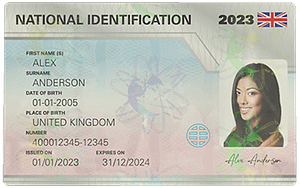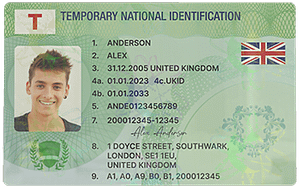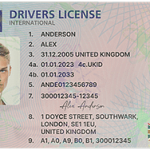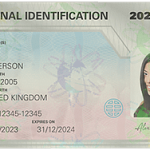Buying a fake ID card online may seem like a quick – fix solution for some individuals looking to access age – restricted services, evade identification requirements, or engage in other prohibited activities. However, this seemingly simple act is fraught with numerous hidden dangers that can have far – reaching and severe consequences.
Legal Risks
One of the most significant and immediate dangers is the legal implications. In almost every jurisdiction around the world, the creation, sale, and purchase of fake ID cards are illegal activities. Law enforcement agencies take a very tough stance on this issue as fake ID cards can be used for a variety of criminal purposes, such as identity theft, fraud, and underage drinking or gambling. If caught in the act of purchasing a fake ID card online, the buyer can face criminal charges. These charges can range from misdemeanors to felonies, depending on the jurisdiction and the nature of the intended use of the fake ID. For example, in the United States, possession of a fake ID for the purpose of underage drinking is typically a misdemeanor, but if the fake ID is used for more serious criminal activities like credit card fraud or identity theft, it can be a felony. Felony convictions can result in long – term imprisonment, hefty fines, and a permanent criminal record, which can severely limit an individual’s future opportunities in terms of employment, housing, and even educational pursuits.

Moreover, the legal risks do not stop at the point of purchase. If the fake ID is detected during use, whether it is at a bar, a club, or during a routine police check, the consequences can be equally severe. Law enforcement officers are well – trained to spot fake ID cards, and with the advancement of technology, it has become even easier to detect forgeries. A fake ID may have visible signs of being counterfeit, such as poor quality printing, incorrect holograms, or misaligned text. Once detected, the individual can be arrested, and the legal process will ensue, leading to potential fines, community service, or imprisonment.
Identity Theft and Privacy Concerns
When purchasing a fake ID card online, individuals often have to provide personal information to the sellers. This information can include details such as full name, date of birth, address, and sometimes even social security numbers or other forms of identification numbers. These sellers are often operating in the illegal underworld and cannot be trusted with personal data. There is a high risk that this information will be misused or sold to other criminal elements. Identity theft is a very real and common consequence of providing personal information to unregulated and illegal online vendors.

Identity thieves can use the stolen information to open credit cards in the victim’s name, take out loans, or make unauthorized purchases. This can lead to a damaged credit score, financial losses, and a long and difficult process of restoring one’s identity and creditworthiness. Victims of identity theft may have to spend months or even years dealing with the aftermath, including filing police reports, disputing fraudulent charges, and working with credit bureaus to correct their credit records. In addition to financial losses, identity theft can also cause a great deal of emotional distress and anxiety for the victims.
Quality and Functionality Issues
Fake ID cards purchased online are often of very poor quality. These cards are typically produced using substandard materials and printing techniques. As a result, they may not pass even basic scrutiny. For example, the magnetic strip on a fake ID may not work properly, or the hologram may be of low – quality and easily detectable as a forgery. When trying to use a fake ID in a real – world situation, such as entering a bar or purchasing age – restricted products, the poor quality of the card can be a dead – giveaway.
Moreover, the information on the fake ID may not match up with the security databases that are increasingly used in various establishments. Many bars, clubs, and retailers now use advanced ID – scanning technology to verify the authenticity of IDs. These scanners can check the ID against a database of valid identities and can quickly detect any discrepancies. A fake ID that has incorrect or fabricated information is likely to be flagged by these scanners, leading to immediate suspicion and potential legal trouble for the user.
Association with Criminal Networks
Online vendors of fake ID cards are often part of larger criminal networks. By engaging with these vendors, individuals are inadvertently associating themselves with criminal activities. These networks may be involved in other illegal activities such as drug trafficking, human smuggling, or money laundering. Law enforcement agencies are constantly monitoring and targeting these criminal networks, and those who have purchased fake ID cards from them may find themselves under investigation or even implicated in other more serious crimes.
Even if an individual has no intention of being involved in other criminal activities, the mere act of purchasing a fake ID from a criminal – associated vendor can create a link that can be difficult to explain away. Law enforcement may view such a purchase as part of a larger pattern of criminal behavior, and the individual may have to go through a long and stressful process to clear their name and prove their innocence.
Social and Reputational Consequences
Beyond the legal and financial risks, buying a fake ID online can also have significant social and reputational consequences. If an individual is caught with a fake ID, it can damage their reputation among family, friends, and the community. It can also have an impact on their academic or professional life. In an academic setting, students caught with fake IDs may face disciplinary actions such as suspension or expulsion. In the workplace, employees who are found to have used fake IDs may be fired and may find it difficult to secure future employment.
Furthermore, the social stigma associated with being involved in illegal activities related to fake IDs can be long – lasting. An individual may be labeled as untrustworthy or irresponsible, which can affect their personal relationships and social standing. The negative impact on one’s reputation can be difficult to reverse, and it may take a long time and a lot of effort to rebuild trust and a positive image in the eyes of others.
Common Problems and Solutions
- Problem: Temptation to Buy a Fake ID for Underage Access
Solution: Instead of resorting to illegal means, young people should be educated about the long – term consequences of using fake IDs. Parents, schools, and community organizations can play a role in providing information about the legal risks, as well as the social and personal costs. Encouraging young people to wait until they are of legal age to access age – restricted activities can help them avoid the pitfalls of fake ID use. For example, schools can organize workshops on the dangers of fake IDs and invite law enforcement officers or legal experts to speak. - Problem: Lack of Awareness about Identity Theft Risks
Solution: Public awareness campaigns can be launched to educate people about the risks of providing personal information to unregulated online sources. These campaigns can use various media platforms, such as social media, television, and print, to reach a wide audience. Tips on how to protect personal information, such as not sharing sensitive data with unknown websites or individuals, can be provided. Additionally, financial institutions and credit bureaus can offer resources and tools to help individuals monitor their credit and detect any signs of identity theft early. - Problem: Inability to Detect Fake ID Quality
Solution: Establishments that deal with ID verification, such as bars, clubs, and retailers, should invest in advanced ID – scanning technology. Training employees on how to use this technology effectively and how to spot the physical signs of a fake ID can also be beneficial. For example, employees can be trained to look for inconsistencies in the printing, hologram, and overall appearance of the ID. Additionally, law enforcement agencies can provide guidelines and resources for businesses on ID verification to ensure they are better equipped to handle fake IDs. - Problem: Unaware of Association with Criminal Networks
Solution: Law enforcement can conduct outreach programs to inform the public about the connection between fake ID vendors and larger criminal networks. These programs can be targeted at different age groups and communities. For example, community centers can host events where law enforcement officers explain the risks of dealing with illegal online vendors and how these vendors may be part of more serious criminal operations. This can help individuals make more informed decisions and avoid getting involved with such networks. - Problem: Damage to Reputation After Fake ID Incident
Solution: For individuals who have faced the consequences of a fake ID incident, there should be support systems in place to help them rebuild their reputation. This can include counseling services to deal with the emotional stress, as well as guidance on how to take steps to repair their image. For example, they can engage in community service or other positive activities to show that they have learned from their mistakes and are committed to being responsible members of society. Employers and educational institutions can also be more understanding and provide opportunities for rehabilitation, such as allowing individuals to prove themselves through their work or academic performance over time.



